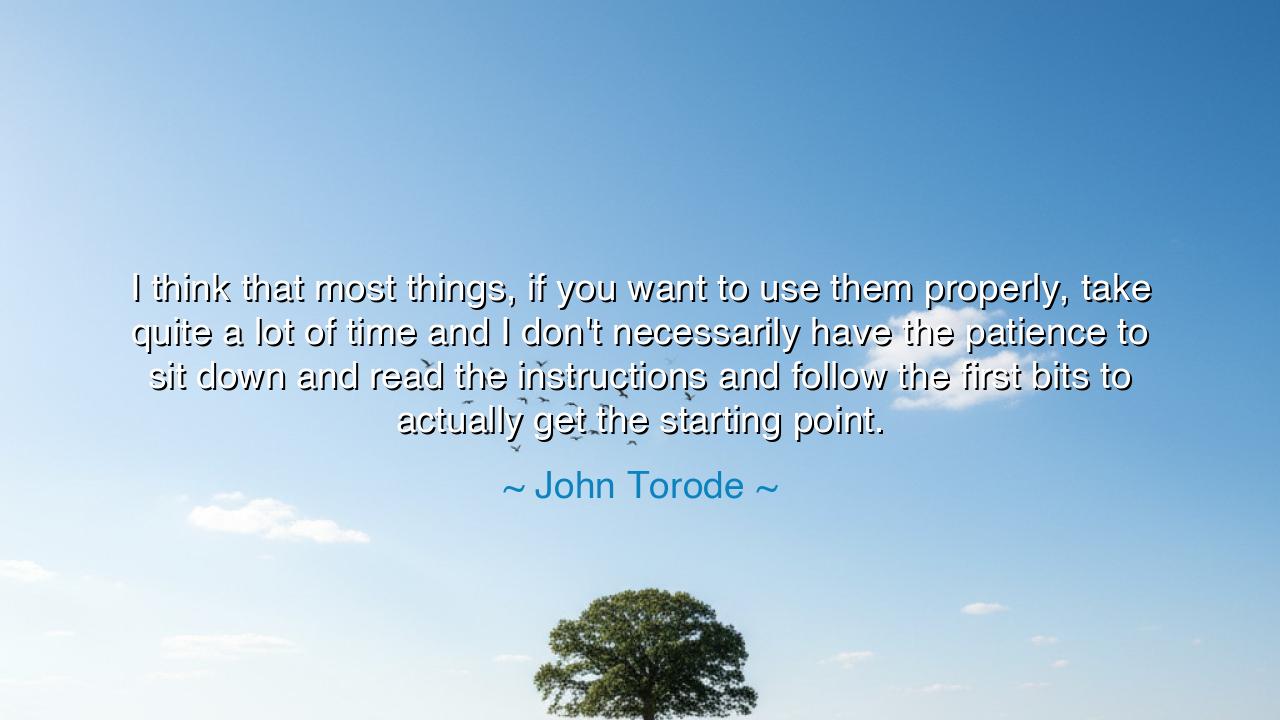
I think that most things, if you want to use them properly, take
I think that most things, if you want to use them properly, take quite a lot of time and I don't necessarily have the patience to sit down and read the instructions and follow the first bits to actually get the starting point.






John Torode once confessed with honesty: “I think that most things, if you want to use them properly, take quite a lot of time and I don’t necessarily have the patience to sit down and read the instructions and follow the first bits to actually get the starting point.” In these words lies not only the voice of a man who has built his craft in the kitchen, but also a mirror for all humankind. For the path of mastery is rarely swift. The tools of life — whether humble or mighty — demand more than mere possession; they demand time, patience, and the humility to learn their secret language.
In ages past, the blacksmith’s hammer was not given to a boy on his first day. He began instead with the bellows, learning the breath of the fire, tending its hunger until the flame spoke back to him. Only after long seasons was he allowed to hold the iron tongs, and longer still before he struck the metal. The instructions were not written on parchment, but passed down in sweat, in burns, in endless hours of labor. To ignore the early lessons was to shatter the blade, to waste the ore, to dishonor the craft. Torode’s words remind us of this ancient law: without a starting point, there can be no ascent to mastery.
Yet there is a tension within us — a yearning to leap ahead, to create without delay. We hunger for results before the foundation is laid, just as a farmer might dream of harvest without first planting the seed. This impatience is not new; it has lived in every age. Consider the tragic tale of Icarus, who, impatient with the slow pace of his father Daedalus, soared too near the sun with wings not yet proven. His fall was not merely from the sky but from the neglect of patience, from the refusal to honor the careful instructions of wisdom.
And yet, Torode’s confession carries a certain tenderness, for it reveals a truth we often deny: many of us struggle with patience. It is not easy to sit with the mundane, to walk the early steps of the path. But here lies the secret: to admit our weakness is the first step toward overcoming it. A wise soul does not pretend to be perfect, but acknowledges where the spirit must be tempered, where discipline must be forged anew. In this, Torode is like a fellow traveler pointing out the common stumbling stone.
The deeper meaning of his words is this: greatness is hidden in the beginning. The “first bits” that we so often neglect are the foundation stones. To read, to learn, to practice slowly — these are not wastes of time but the very roots that allow the tree to stand in storms. It is the same in music, where endless scales must be played before the song arises. It is the same in war, where the soldier must drill a thousand times before the battle. And it is the same in life, where every craft, every skill, every dream must pass through the valley of patience before it ascends the mountain of achievement.
From this teaching, let us draw a lesson: embrace the starting point. Do not despise small beginnings, nor turn away from the instructions that seem slow or simple. Instead, see them as the sacred gate, the threshold through which all mastery must pass. To rush is to weaken your foundation; to be patient is to build a fortress.
So let the listener take action: when next you face a new tool, a new skill, or a new journey, pause. Sit with the first steps. Read, learn, repeat. Allow patience to clothe you as armor, and humility to guide you as a lamp. For though the path may seem slow, it leads surely to greatness. And remember Torode’s words not as a lament but as a call: that by conquering impatience, by cherishing beginnings, we may use all things not merely in haste, but properly, fully, and with honor.






AAdministratorAdministrator
Welcome, honored guests. Please leave a comment, we will respond soon